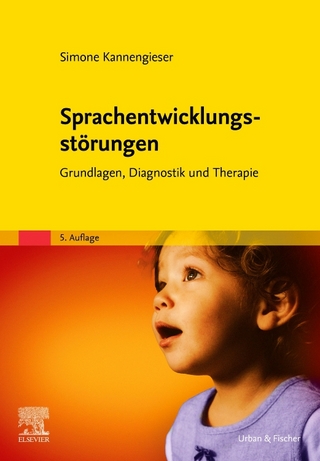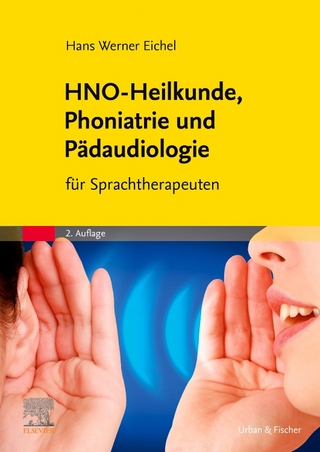
Speech Sound Disorders
Plural Publishing Inc (Verlag)
978-1-63550-662-4 (ISBN)
With three new chapters and updates throughout, Speech Sound Disorders: For Class and Clinic, Fifth Edition offers a readable and practical guide on the care of speech sound disorders. It emphasizes evidence-based principles and procedures that underlie almost all clinical approaches, making this an ideal textbook for a wide variety of undergraduate and graduate courses. The text is divided into four parts: Foundations, Speech Development, Assessment, and Treatment. Contributors supporting Ken E. Bleile's longstanding text include Todd A. Bohnenkamp, Jaimie L. Gilbert, Samantha Ehler, Lindsey R. Squires, Blair M. Voigt, Carlin Hageman, and Evette Edmister.
Key Features
Each chapter begins with learning objectives and key words, and ends with conclusions and review questions
Readable and practical discussions of complex clinical topics
Coverage of speech sound disorders from infants through adults
Clear link between speech development and clinical decision making
Emphasis on underlying principles and procedures
New to the Fifth Edition
Three new chapters!
Treatment Approaches by Blair M. Voigt
Motor Learning by Carlin Hageman
Late Sounds en Espanol by Lindsey R. Squires
Updated developmental speech milestones incorporate the latest information from multiple languages
PluralPlus Online Ancillaries
For Instructors:
PowerPoint slides with non-copyrighted pictures covering the main ideas in chapters
A test bank with 200 objective questions with answers
Answers for the exercises in the "learn by doing" chapters
For Students:
Recordings that summarize main ideas in all the chapters written by the author
Note helpers for chapters and recordings by the author
Every recording concludes with 10 review questions of main ideas in the chapter
Assessment Resources:
Questions to help assess social impact of communication
Procedures to measure severity and intelligibility
Lists of developmental milestones from infants through students
Tools for informal speech assessments from toddlers through students
A Selection of published tests
Treatment Resources:
A 20-minute audio presentation on motor learning
15 brief narrated treatment videos of children with speech sound disorders
Descriptions and demonstrations to help teach every consonant
Over 100 phonetic placement and shaping exercises
Hundreds of activities for infants, toddlers, preschoolers, and students to promote speech during play, in daily life and school, in reading, and in language
Ken M. Bleile, PhD, is a Professor in the Department of Communication Sciences and Disorders at the University of Northern Iowa. Dr. Bleile is an ASHA Fellow and a recipient of the Iowa Regents' Scholar Award, the Fine Arts Dean's Award for Teaching Excellence. and an Editor's Choice Award from The Journal of Speech and Hearing Disorders. Dr. Bleile served twice as Associate Editor of the American Journal of Speech-Language Pathology. He is the former Chair of ASHA's International Issues Board and is a recipient of the association's Multicultural Board's Diversity Champion Award.
Preface
Companion Website Resources
Acknowledgments
Contributors
Dedication
Part I. Foundations
Chapter 1. A Speech Framework
The Dual Nature of Speech
Speech in Human Communication
Summary: Speech Framework
A Final Thought: Giving Back
Conclusions
Review of Main Ideas
References
Chapter 2. Speech Sound Disorders
What is a Speech Sound Disorder?
Why Study Speech Sound Disorders?
The Nature of Speech Sound Disorders
Will This Help Someone?
Conclusions
Review of Main Ideas
References
Chapter 3: Speech Production
Todd A. Bohnenkamp
Learning Objectives
Key Words
Speech in the Brain
Speech in the Muscles
Conclusions
Review of Main Ideas
References
Chapter 4. Speech Reception and Perception
Jaimie L. Gilbert
Introduction
Sound in the Air
Sound in the Ear
Sound in the Brain
Conclusions
Review of Main Ideas
References and Recommended Readings
Chapter 5. Phonetics Warm-Up
Transcription
International Phonetic Alphabet
Notations
Speech Exercises
Conclusions
References
Part II. Speech Development
Chapter 6. Infants
With Samantha Ehler
Speech Perception
Vocal Production
Summary: In a Word
Sound Communication
Conclusions
Review of Main Ideas
References
Chapter 7. Toddlers
Speech Perception
Speech Production
Summary: Puzzle Pieces
Sound Communication
Conclusions
Review of Main Ideas
References
Chapter 8. Preschoolers
Learning Objectives
Key Words
Speech Perception
Speech Production
Summary: A Challenge that Stretches
Sound Communication
Conclusions
Review of Main Ideas
References
Chapter 9. Students
Speech Perception
Speech Production
Summary: Speech Development in School
Sound Communication
Conclusions
Review of Main Ideas
References
Chapter 10. Speech Puzzles
Communication Strategies
Exercises
Conclusions
References
Part III. Assessment
Chapter 11. Speech Evaluation
Overview
Referral
History
Present Development
Clinical Decisions
Implementation
Conclusions
Review of Main Ideas
References
Appendix 11–A. Speech Evaluation Checklist
Appendix 11–B. Quick 11-Step Screener of Oral Structure and Function
Chapter 12. Assessing a Bilingual Child
Lindsey R. Squires
Introduction
Special Topics in Assessment
Conclusions
Review of Main Ideas
References
Appendix 12–A. Template for Evidence-Based Case History
Chapter 13. Hypothesis Testing
Optimal Settings and Otherwise
Test Methods
Speech Samples
Transcription
Conclusions
Review of Main Ideas
References
Appendix 13–A. Preventable Harm
Appendix 13–B. Elicitation
Chapter 14. Phonetic Inventories
Consonant Inventories
Exercises
Conclusions
References
Chapter 15. Phonological Patterns
Definitions
Exercises
Conclusions
References
Part IV. Treatment
Chapter 16. Developmental Goals
The Developmental Logic of Treatment
Stages in Speech Development
Developmental Speech Goals
Infants
Toddlers
Preschoolers
Students
Conclusions
Review of Main Ideas
References
Chapter 17. Treatment Sounds
Selecting a Treatment Sound
Establishing a Treatment Sound
Perception Training
Practicing Speech
Conclusions
Review of Main Ideas
References
Chapter 18. Treatment Approaches
Blair M. Voigt
Overview
Articulation Approaches
Minimal Pairs Approach
Cycles Approach
Multiple Oppositions Approach
Complexity Approach
Maximal Oppositions Approach
Core Vocabulary Intervention
Integrated Phonological Awareness Intervention
Conclusions
Review of Main Ideas
References
Chapter 19. Motor Learning
Carlin Hageman
Motor Skills
Motor Control
Principles of Motor Learning
Conclusions
Review of Main Ideas
References
Chapter 20. Late Sounds en Espanol
Lindsey R. Squires
Phonologies of English and Spanish: Differences and Similarities
Late Developing Sounds in Spanish
Treatment Strategies for Late Sounds en Español
[s]
[l]
Tap [r] and Trill [ɾ]
Conclusions
Review of Main Ideas
References
Chapter 21. Talking with Children
Parentese
Facilitative Talk
Therapy Talk
Conclusions
Review of Main Ideas
References
Chapter 22. Talking About Speech
Metaphors
Touch Cues
Descriptions and Demonstrations
Phonetic Placement and Shaping
Conclusions
Review of Main Ideas
References
Chapter 23. Supporting Communication
Evette Edmister
What is AAC?
Benefits of AAC
Treatment Strategies
Conclusions
Review of Main Ideas
References
Chapter 24. The Daily Researcher
Evaluating Treatment Approaches
Assessing Treatment Progress
Dynamic Assessment
Conclusions
Review of Main Ideas
References
Chapter 25. Sound Decisions
Definitions
Exercises
Conclusions
References
Appendix A: Special Symbols and Diacritics
Appendix B: Definitions
Index
| Erscheinungsdatum | 07.11.2023 |
|---|---|
| Verlagsort | San Diego |
| Sprache | englisch |
| Maße | 178 x 254 mm |
| Themenwelt | Medizin / Pharmazie ► Gesundheitsfachberufe ► Logopädie |
| ISBN-10 | 1-63550-662-X / 163550662X |
| ISBN-13 | 978-1-63550-662-4 / 9781635506624 |
| Zustand | Neuware |
| Haben Sie eine Frage zum Produkt? |
aus dem Bereich


